Note: This story, originally published in 2014, highlights the UO's School of Planning, Public Policy and Management's pioneering decision to incorporate actual grant-making into its curriculum. More than a decade after that decision, the same grant-making process is included in the PPPM 486/586 Philanthropy and Grantmaking course, but the grant amount is now at $20,000, up from $5,000.
Students in the “American Philanthropy” freshman seminar have selected KindTree Productions, a Eugene-based nonprofit organization, to receive a $5,000 grant from Wells Fargo.
Students learn to practice the fundamentals of charitable giving by partaking in the annual course, which is offered through the Department of Planning, Public Policy and Management. Groups form to consider local nonprofits that either applied for the grant or were nominated by students. Students visit the nominees to gather information and craft an argument that their organization is most deserving.
Group members Preston Crumbly, Jonathan Hawthorne, and Ashley Robles researched and advocated for KindTree in the weeks leading up to the vote on March 3. KindTree also received the $5,000 grant from “American Philanthropy” last year in winter 2013.
“If we could just give them a small bit of our time to give back to this wonderful organization, then I feel like we’ve done them justice,” said Hawthorne, a pre-journalism major.
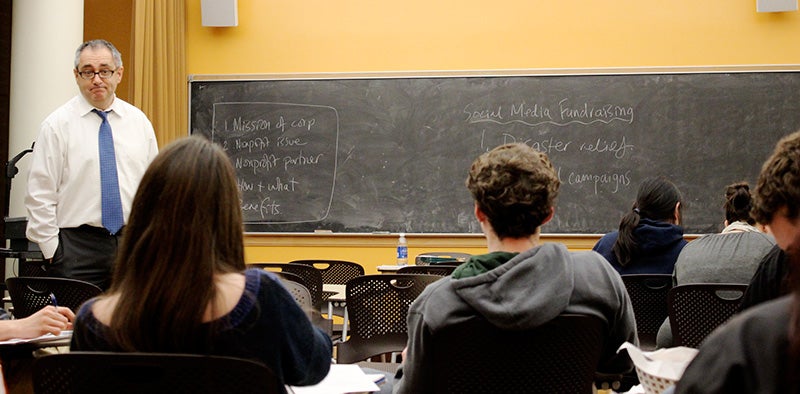
Above: Paul Elstone, associate vice president for development and the seminar’s instructor, says that “One of the things that’s really changed in the curriculum of the course is the whole idea of social media fundraising.” Photograph by Emerson Malone.
KindTree serves people on the autism spectrum through art, recreation, and community. The organization’s projected revenue for 2014 was $80,000, 13 percent of which is through grants. Since some grant proposals were not funded, the $5,000 earned from “American Philanthropy” will directly benefit radio and video equipment, art supplies, rent, food, and scholarships for its summer camp “Autism Rocks.” The summer camp takes place this August on the Oregon Coast.
“Not everyone with autism can live by themselves and they can’t really lead productive lives without people like KindTree. They need to assimilate to society and … be productive members. They need to feel they are worth something,” said Crumbly, who nominated KindTree for the grant.
People diagnosed with autism create pieces through the art program, and New York University has solicited artworks produced through KindTree.
Food for Lane County, Looking Glass, and Greenhill Humane Society were among the other nonprofit finalists being considered for the grant. KindTree was elected the victor on March 3 and received the check on Wednesday, March 12, in Hendricks Hall.
The course established a partnership between UO and Wells Fargo when PPPM associate professor Renee Irvin asked Dave Frosaker, then a Wells Fargo Senior Trust Specialist, to employ Wells Fargo as a corporate sponsor in 2002. This winter 2014 seminar marks the last year of involvement by Frosaker, who recently retired.
“Dave has been the consistent champion at Wells Fargo to secure the funding every year,” said Paul Elstone, associate vice president for development and the seminar’s instructor. “Dave has been absolutely critical to the success of this class.”
Frosaker worked for Wells Fargo for fifteen years and spent thirty-eight years in the trust and investment business. He says he is proud of the fact that, while working with the University of Oregon on this collaboration, students in the class have helped Wells Fargo donate $60,000 to Eugene and Springfield-based nonprofits.
Frosaker noted that the partnership with the American Philanthropy course was mutually beneficial for both UO students and Wells Fargo.
“At Wells Fargo, we don’t consider this support to be simply charitable giving,” he said. “We consider it investing in our community. We realize that when the communities in which we do business thrive, we thrive as well. These student-directed contributions help make our community a better place to live for all of us.”
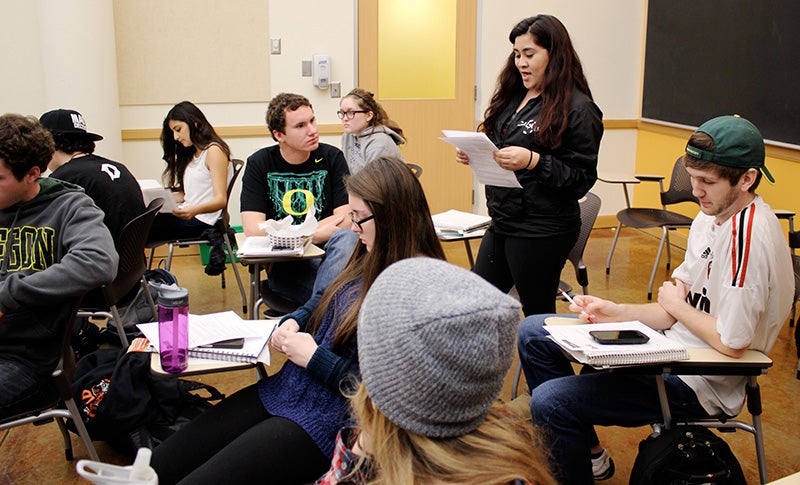
Above: Ashley Robles presents her group’s strategy in social media fundraising during an in-class exercise. Photograph by Emerson Malone.
During one day in class this term, Elstone showed the class an advertisement that featured the Gucci logo alongside the United Nations Children’s Fund (UNICEF) logo. Why would an Italian fashion brand partner with a humanitarian aid and emergency relief organization?
“Why do corporations care about philanthropy?” he asked the class.
He chalked their answers on the board: public relations, tax benefits, community investment, employee satisfaction, and civic pride, among others.
“American Philanthropy” is based on a notion written in its course description: “Giving away money is harder than it looks.”
The nonprofit organization selected each year must adhere to guidelines from Wells Fargo to receive the grant. The $5,000 grant can make a big difference for a smaller nonprofit, where the funding may augment its annual fundraising, or for a larger nonprofit organization with an expansive budget.
“It’s not a matter of deciding that one is better than another. It’s about whether they can deliver,” said Elstone. “They’re really investing Wells Fargo’s money, so they have to decide that it’s actually going to happen.”
Since its launch, the “American Philanthropy” course model has been duplicated and incorporated at high schools and universities throughout the country.
“The impact extends well beyond University of Oregon and Eugene and is now touching a number of communities across America and is benefitting students in a number of colleges and universities,” said Frosaker.
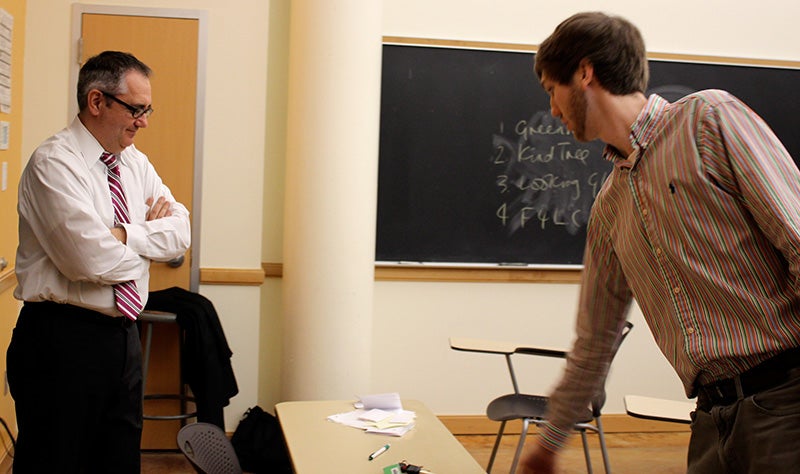
Above: Preston Crumbly casts his vote for which nonprofit organization is most worthy of the $5,000 grant. Photograph by Emerson Malone.
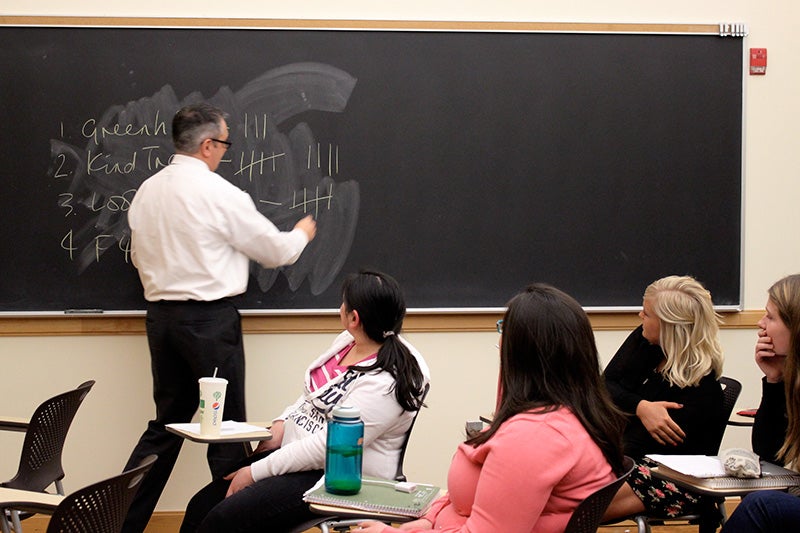
Above: Paul Elstone tallies the students’ collected votes for the nonprofit organization. Photograph by Emerson Malone.
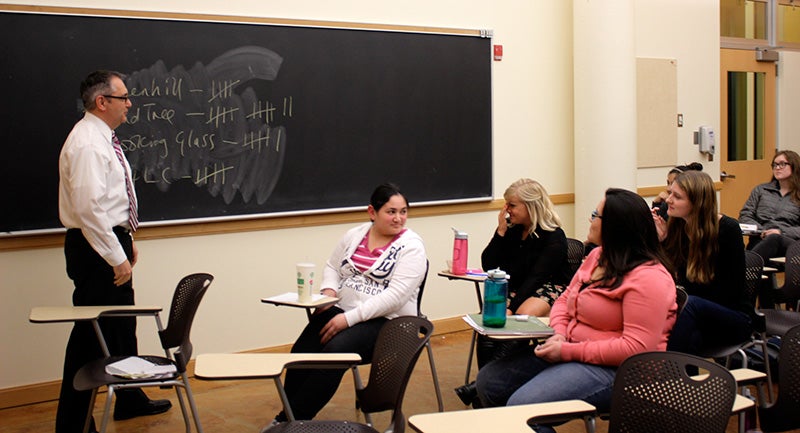
Above: KindTree Productions won the vote with a majority of twelve votes. Photograph by Emerson Malone.
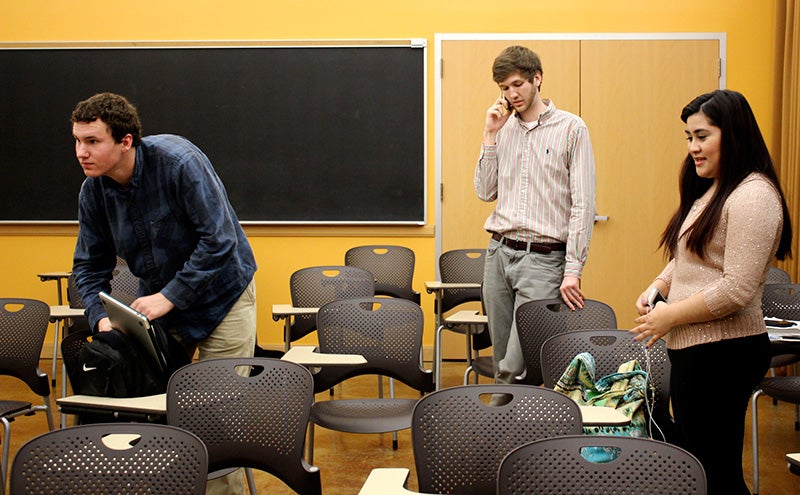
Above: Jonathan Hawthorne (from left), Preston Crumbly, and Ashley Robles were in the group who advocated for KindTree Productions. Crumbly gives a call to a KindTree board member to deliver news of the victory on the night of Monday, March 3. Photograph by Emerson Malone.
